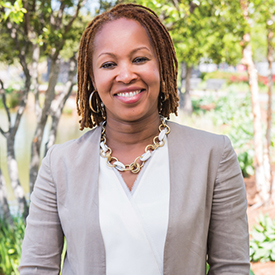 Katisha Vance is the Jefferson County Medical Society president.For Katisha Vance, M.D., August 1986 changed the course of her life, both personally and professionally. She said goodbye to her maternal grandmother, Mattie Stinson, who died at age 64 from metastatic colorectal cancer. That was also when the first seeds were planted for her future career in medicine.
Katisha Vance is the Jefferson County Medical Society president.For Katisha Vance, M.D., August 1986 changed the course of her life, both personally and professionally. She said goodbye to her maternal grandmother, Mattie Stinson, who died at age 64 from metastatic colorectal cancer. That was also when the first seeds were planted for her future career in medicine.
“I was always close with my Grandma Mattie, who was a mother of 12 and worked her entire life,” says Vance, a physician at Baptist Princeton Medical Center’s Alabama Oncology. “Back then, treatment options were limited for patients with stage IV disease. Fortunately, today we have an ever-increasing number of therapies to help patients in the fight of their lives. I’m motivated to come to work every day to help someone else’s Mattie.”
Vance says she solidified her decision to become a physician during her senior year as an undergraduate at the University of Alabama. “I’d initially planned to get a Ph.D. in chemistry, run a lab, and teach,” says Vance, a 2000 graduate of the School of Medicine.
“My ‘aha’ moment came in the lab one quiet Friday afternoon when nobody was around. I recognized pretty quickly that I should change my plans, and my Introduction to Medicine class my senior year reinforced that decision.”
Although she decided to become a physician in college, Vance says the decisions she makes as an oncologist are still guided by her grandmother’s legacy. “She taught me how valuable it is to really listen to every patient,” says Vance. “I also learned the importance of working through difficult situations with my patients and colleagues, even when the solution is not readily apparent. You have to do the best you can each day.” Vance completed her residency in 2004 at Baptist Health System in Birmingham, and a hematology and oncology fellowship at UAB in 2007.
Growing up in Waugh, Alabama, a small town 15 miles east of Montgomery, Vance’s two favorite subjects in high school were English and chemistry. Her favorite experiences as a medical student at the School of Medicine came when studying.
“My fondest memories are of those late nights studying harder than you ever had in your life,” she reminisces. “Those nights were usually followed by some incredibly fun things like dinner and dancing with your buddies.”
As the current president of the Jefferson County Medical Society (JCMS) , Vance is committed to raising awareness of physician burnout. She says she strongly believes doctors need each other to survive, and she encourages physicians to ask for help when they need it. “It’s a blessing and a curse, but I think that medicine attracts people who are highly self-sufficient, sometimes to our detriment,” says Vance. “I spoke with a colleague recently about how so many doctors are embarrassed to admit they are struggling professionally or personally. That insistence on self-sufficiency can be crippling. It keeps us from asking for help.”
Vance says she is also working to confront health disparities issues in her capacity as JCMS president. “We are coordinating a cultural competency seminar, because it’s clear that health care disparities are largely caused by knowledge gaps about minority groups,” she says. “That comes across in patient-physician interactions.”
Vance notes that visiting with her patients helps enhance her patient-physician interactions. “Some of my most rewarding days come from visiting with patients who have been with me since I started 10 years ago,” she says. “We talk about kids and grandkids, family vacations, and other normal things. That’s important, because so many people think of cancer as a death sentence. That’s not always the case in 2017. People need to know that.”
To learn more about the Jefferson County Medical Society, visit jcmsalabama.org or contact Executive Director Martha Waters Wise at mwise@jcmsalabama.org or 205-933-8601.
By Cindy Riley